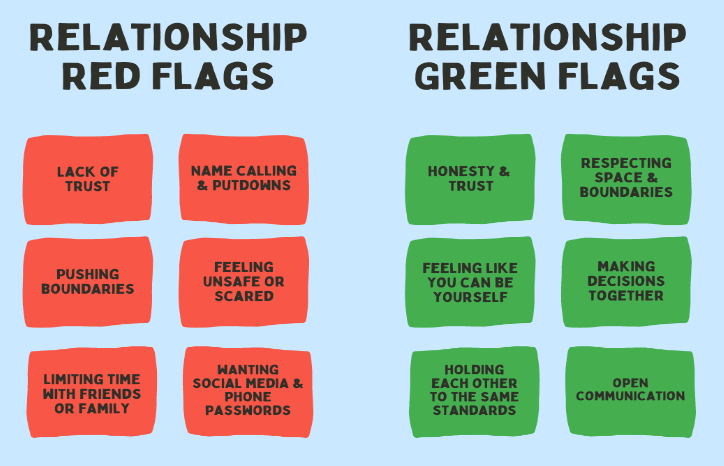Knowing the signs of an unhealthy relationship may seem like a no-brainer, but it’s not always that simple.
Written by: Hollie White, MSW, LCSW
Remember, abuse can happen to anyone of any gender, sexual orientation, religion, race/ethnicity, and personality.
It is important to understand that a relationship does not have to be abusive to be unhealthy for you. Relationships should be mutually beneficial and loving. You should get more from a relationship than it robs you. If you are in a healthy relationship, the changes that you make should have a purpose of growth. If you are in an unhealthy relationship, it is likely that change will look more like appeasement in an effort to keep the peace.
Look for Signs of Abusive Behavior
With that being said, it is important to look out for signs of abusive behavior. The National Domestic Abuse Hotline is a good resource for learning valuable information. The article, “Recognize the signs of relationship abuse” shares the following bullet points as signs of abusive behavior in a partner.
- If they show extreme jealousy or discourage you
- If your partner shames or insults you
- If they are jealous of your time spent with others
- If someone is discouraging you from seeing the people you love
- If they are keeping you from participating in the things you love to do
In a relationship, you shouldn’t feel shame from your partner. They should never degrade or insult you. Your partner should use positive vocabulary when talking to you or about you. Your partner should be the one to support you and demonstrate healthy qualities. There should be a give and take in what you want, and what your partner wants. These negotiations and compromises should be done openly and honestly, versus feeling bullied or obligated to do something that makes you feel uncomfortable. There are countless ways that a person can behave that may deem your relationship unhealthy. Other signs of danger include harming you, your family, or even your animals. This includes both physical and emotional abuse.


Emotional Abuse
One common form of emotional abuse that can be difficult to spot at times, is called gaslighting. This often missed sign can include feeling like you are going crazy and slowly questioning your own reality and memory. Overall the slower and less immediately harmful the signs are, the less likely they are to be noticed. Relationships almost never start out violent, it is a build.
Gaslighting, as defined by Merriam-Webster, is the “psychological manipulation of a person usually over an extended period of time that causes the victim to question the validity of their own thoughts, perception of reality, or memories and typically leads to confusion, loss of confidence and self-esteem, uncertainty of one’s emotional or mental stability, and a dependency on the perpetrator.”
If your partner is gaslighting you, not only will you question your own validity, but you will also tend to rely on them for stability. Typically, they start with smaller things; telling you that certain behaviors of yours are the opposite of what they truly are, or planting false seeds of doubt about a relationship with a family member or friend. A “successful” gaslighter will render the victim completely reliant on the abuser.
Need additional resources related to being in an unhealthy relationship or the other barriers connected to leaving an abusive relationship? See below for more resources outside of working with a therapist at Pathways Consulting:
- End Domestic Abuse Wisconsin
- Women and Children’s Horizons
- Call (262) 652-9900 (24/7)
- Women’s Resource Center of Racine
- Crisis Line: 262-633-3233
- Office: 262-633-3274
- Racine County Family Resources
- NAMI Kenosha County
- Comprehensive Resource Hotline: Call 211
- Safe Haven Racine
- Call 262-637-9559 (available 24/7)
- BeLeaf Survivors
- 24/7 crisis line: 262-637-7233
- National Domestic Abuse Hotline
- Call 1.800.799.SAFE (7233)
- Text “START” to 88788
- Racine CRISIS (262) 638-6741
- Kenosha CRISIS (262) 657-7188
